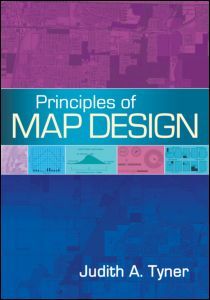Description
Principles of Map Design
Author: Tyner Judith A.
Language: English
Subjects for Principles of Map Design:
Publication date: 05-2014
· 17.8x25.4 cm · Paperback
Approximative price 116.47 €
In Print (Delivery period: 15 days).
Add to cartPublication date: 04-2010
258 p. · 17.8x25.4 cm · Hardback
Description
/li>Contents
/li>Readership
/li>Biography
/li>Comment
/li>
This authoritative, reader-friendly text presents core principles of good map design that apply regardless of production methods or technical approach. The book addresses the crucial questions that arise at each step of making a map: Who is the audience? What is the purpose of the map? Where and how will it be used? Students get the knowledge needed to make sound decisions about data, typography, color, projections, scale, symbols, and nontraditional mapping and advanced visualization techniques.
Pedagogical Features:
*Over 200 illustrations (also available at the companion website as PowerPoint slides), including 23 color plates
*Suggested readings at the end of each chapter.
*Recommended Web resources.
*Instructive glossary
I. Map Design 1. Introduction 2. Planning and Composition 3. Text Material and Typography 4. Color in Cartographic Design II. Geographic and Cartographic Framework 5. Scale, Compilation, and Generalization 6. The Earth's Graticule and Projections III. Symbolization 7. Basics of Symbolization 8. Symbolizing Geographic Data 9. Multivariate Mapping IV. Nontraditional Mapping 10. Cartograms and Diagrams 11. Continuity and Change in the Computer Era V. Critique of Maps 12. Putting It All Together Appendix A. Commonly Used Projections Appendix B. Resources Appendix C. Glossary
Judith A. Tyner, PhD, is Professor Emerita of Geography at California State University, Long Beach. She taught in the Geography Department for over 35 years, where she served as Department Chair and as Director of the Cartography/GIS Certificate Program from its inception until her retirement. While at California State Dr. Tyner taught beginning and advanced cartography, map reading and interpretation, history of cartography, and remote sensing. She is a member of the Association of American Geographers, the North American Cartographic Information Society, the Cartography and Geographic Information Society, and the California Map Society. She is the author of two previous textbooks and over 30 articles.
These books may interest you

Health and Medical Geography 73.59 €



